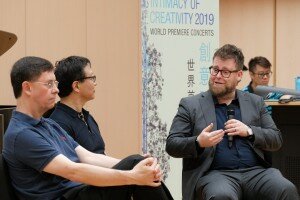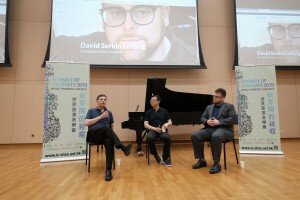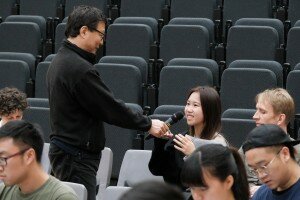
© Wailok Cheung
This was Dr. Ludwig’s first time in Hong Kong, although he’d been to China before. The vibrancy and modernity of the city was, for him, echoed in the vibrancy, excitement, and warmth of the festival. The IC festival matches performers, composers, and audience in the creative process of composition. Through the week preceded the concert, composers and performers workshopped the music. The performers were the members of the Curtis 20/21 Ensemble, which included the Vera Quartet, clarinettist Andrew Moses, and pianist Zitong Wang, as well as additional guest artists Wang Hua on Chinese flute (dizi), Andy Lin on erhu, and pianist Yael Manor. The composers were an international group: Eugene Astapov (Canada), Kai-Young Chan (Hong Kong), Dai Wei (China), Peter Dayton (USA), and Keane Southard (USA).
Luwig: Seasons Lost: I. Winter (Jennifer Koh, violin; Jaime Laredo, violin; Curtis 20/21 Ensemble; Vinay Parameswaran, cond.)

© Wailok Cheung
Bartók: Contrasts (Sz. 111): I. Verbunkos (Recruiting Dance): Moderato, ben ritmato (James Ehnes, violin; Michael Collins, clarinet; Andrew Armstrong, piano)
We spoke about what young composers could take away from the experience, so unlike anything else they’d been exposed to. Dr. Ludwig felt that the festival itself was empowering to young composers – although they might have pre-workshop trepidation about exposing their music and their ideas to an audience, when they were through, they were the stronger for it. The shifting role of the audience, where they move from being part of the collaboration process to sitting in the chairs during the final concert, also had an effect on the composers. The audience, in the end, is the final arbiter – it’s their response that the composer should be looking at most closely. Composers need to develop a line of communication with the audience – they need to build content around a work, be it by pre-concert lectures, extensive programme notes, or just speaking with the audience before or after a performance. Dr. Ludwig thought that much new music is actually LESS challenging than music from a century ago.
Bartók: String Quartet No. 3 (Sz. 85): II. Allegro (Végh Quartet)

© Wailok Cheung
Sheng: String Quartet No. 4 “Silent Temple”: IV. — (Shanghai Quartet)
Although he walked into the festival not quite knowing what to expect, Dr. Ludwig has come away from IC 2019 seeing that all the excitement, vibrancy and warmth of HK was completely echoed in the festival.

